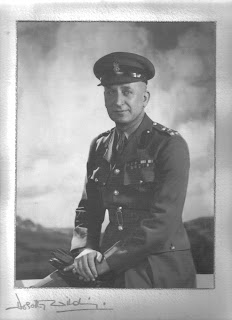Here in the UK it is Father's Day, 20th June 2010. I have been thinking of my own Father and his influence on my life, particularly in my early days when he often talked about his experiences as a doctor in the Second World War. As our medical work expands in Sierra Leone, I am sure that if he was still with us, he would be cheering us on. I was aware of a world outside England from the many items he brought home with him - Indian rugs, brass work, pictures, models and (from those less enlightened days) a tiger skin rug and ivory carvings. I was also aware of the distinguished medical career that he had pursued.
In 1940, Alfred Swindale was in North Africa commanding a Field Ambulance, where he had as his Transport Officer Christopher Landon, who later drew on some of his experiences to write a novel, published in 1957, called Ice-Cold in Alex. This was made into the 1958 film which starred John Mills. A recut version of the film, 48 minutes shorter than the original, was released as "Desert Attack" in 1961 in the US.
My Father was then posted to India where towards the end of the war he was responsible for setting up what was then the world's largest hospital. 'The Mail' for Wednesday, 7th February 1945 records a visit by the Viceroy's wife, "Lady Wavell, accompanied by Lieut-General Sir Noel and Lady Beresford Pierce visited the Hospital Town which is under construction at Jalahall, outside the Bangalore Municipal Limits. It is claimed that, when completed, this will be the biggest Hospital in the world with 10,026 beds. ......
Lady Wavell was received by Col. Swindale (Asst. Director of Medical Services) ... and shown around the works completed and in progress."
He then moved to Burma, also as ADMS. I can remember a pennant from the Rangoon Yacht Club hanging up on the wall at home! Finally, I understand that with the acting rank of Major-General, he had overall responsibility for the repatriation of all the Japanese prisoners of war back to the UK through Singapore, including those who worked on the construction of the Burma Railway in 1942–43.
My Father, Alfred Swindale at the time of his investiture 1948
My first visit to London, a city I love, was to go to Buckingham Palace to see him receive the C.B.E. from King George VI. As a small boy, I was mortified that I needed to go to the lavatory in the middle of the ceremony, and encouraged by my Mother, set off past rows of Yeomen of the Guard to be escorted by a tail-coated courtier for a considerable distance to the required room!
However, to return to the topic in hand, I am proud of him and acknowledge the influence that his work, dedication and six and a half years service overseas must have had on me. It is part of my world-view to wish to see good health and prosperity come to those in need of it. Thank you, Dad!












